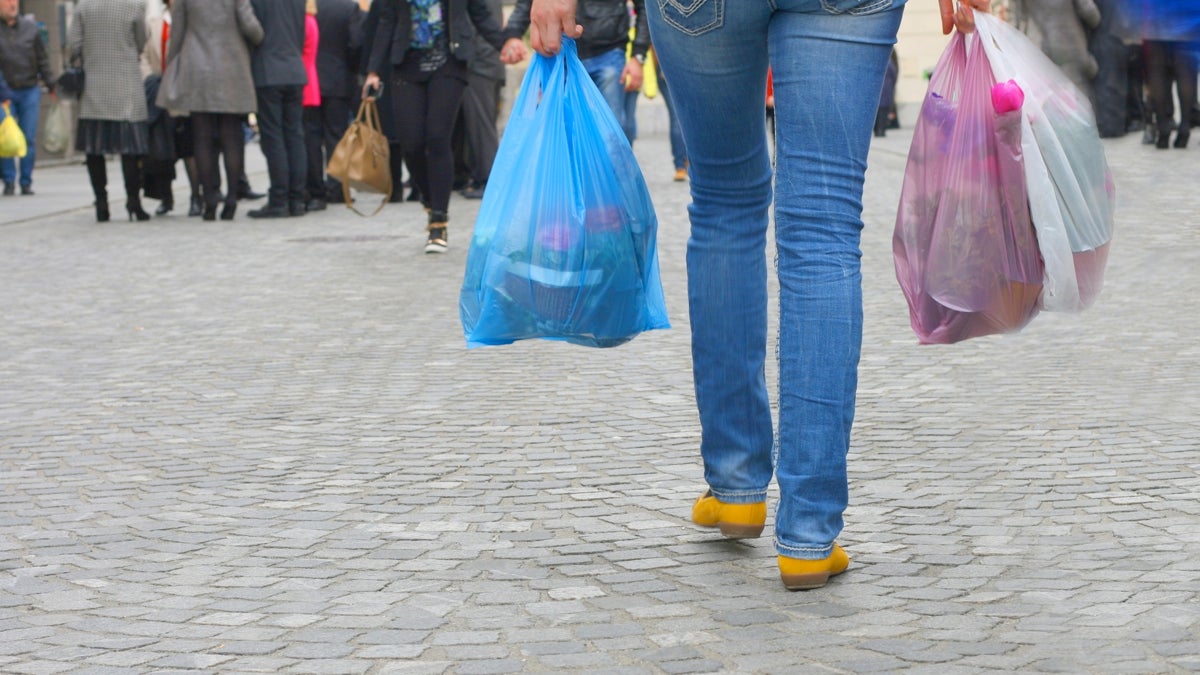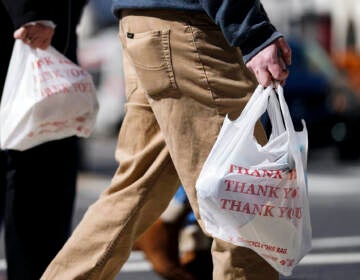Philly residents are betting city’s new plastic bag ban will bring cleaner streets
Philly’s move comes amid a regional movement against the ubiquitous sacs. A state ban on plastic bags will expire a day before the bill goes into effect.

(Photo via Shutterstock)
Seventy-year-old Sandra Calhoun says she cleans the sewers of the block where she lives in West Philly five times a week during the winter and two times a week in the summer.
“I would say 95% of my cleaning is the cleaning of plastic bags. I am pulling plastic bags by the handful,” she said.
Calhoun says the ban on all plastic bags city council passed on Thursday will ease her work and better the health of city residents, the environment, and the sidewalks.
“It’s going to improve on some of the trash and litter in the community,” she said.
Starting on July 2, 2020, stores, restaurants, and delivery services will be required to stop packing their goods in single-use plastic bags. Instead, businesses must provide free paper or recyclable alternatives, according to the newly passed legislation.
The bill, introduced in June by Councilmember Mark Squilla, is the fourth attempt in 12 years to ban plastic bags. It passed with 15 votes and two nays, from councilmembers David Oh and Brian O’Neill, two of the three Republicans on the city legislative body.
The move comes amid a regional movement against the ubiquitous sacs. A state ban on plastic bag restrictions will expire a day before the bill goes into effect. Last week, New Jersey moved forward on a bill that would ban both paper and plastic bags.
Nic Esposito, director of Mayor Jim Kenney’s Zero Waste and Litter Cabinet, said the ban is a huge step forward towards achieving the city’s goal of reducing waste and litter by 90% in 2035.
“Plastic bags are one of the most littered items on the streets of Philadelphia,” Esposito said. “In addition, they wreak havoc on our recycling systems by jamming up machinery. If we are to achieve zero waste by 2035, plastic bags are one of the top single-use plastics to be eliminated.”
Philly uses 1 billion bags annually
Residents and tourists receive about one billion plastic bags in Philadelphia per year, according to estimates by the Clean Air Council. Single-use bags are not recyclable curbside and take about 500 years to break down. They often live out those years as street litter or trapped on trees and in sewers, mucking up local waterways, and finally, floating in oceans. The ban is an attempt to stop that cycle.
The ban on plastic bags will apply to supermarkets, convenience stores, service stations, dollar stores, clothing, and department stores, restaurants and delivery services, food trucks, and farmers’ markets.
Despite some concerns about the ban being voluntary, Squilla reaffirmed Thursday that retailers that ignore the ban could risk fines and penalties, said Squilla.
The bill amends the Philadelphia code regulating businesses, which stipulates the Department of Licences and Inspections can issue fines between $150 and $300 fines to retailers not complying with it. Not paying the fines would cause businesses to get their license revoked and have to cease operations.
The bill also mandates a study on bag use by retailers to be conducted six months before the law goes into effect, six months after, and again in July of 2021. The study will cost about $100,000 paid by the general fund.
“The goal of the bill is to reduce single-use bags by 60% in the first year of implementation,” Squilla said.
Lobbyists representing plastic bag manufacturers and retailers have said the bill will hurt businesses without reducing litter or trash. Paper bags are more expensive, and without a fee, businesses will have to absorb the cost. Alex Baloga, president and CEO of the Pennsylvania Food Merchants Association, said new expenses could seriously affect small shops that operate on thin margins.
Matt Seaholm, Executive Director of the American Progressive Bag Alliance, called the bill “seriously flawed” in a statement.
“We can all agree it will harm residents and small businesses and not achieve the stated goals,” Seaholm said.
Targeted next: straws, styrofoam
The regulation includes all plastic bags made through a blown-film extrusion process, used to fabricate film products, including most single-use bags. But it makes exceptions for plastic bags that can be bought in stores, pet poop bags, dry cleaning bags, and those used inside stores to pack deli items or fruits.
“It will mean that we will see less trash on the streets,” said Ron White, who works with Mural Art’s youth program, Trash Academy, and worked on the bill for a year.
The ban is one of a number of strategies in play as the city seeks to improve its record on street cleaning, an issue Kenney has emphasized as a priority since his 2015 campaign. Philly is one of the only large U.S. cities without a citywide, comprehensive street-sweeping program that hits residential blocks. In November, the city ended a street sweeping pilot that tested a weekly cleaning rotation in six neighborhoods. The city is now working on an evaluation of the program that will inform if and how a citywide residential sweeping program will continue.
For White, progress is happening incrementally. He described the current no-fee plastic bag ban as “a stepping stone for something better.”
His feeling reflects a sentiment shared by many environmentalists. While they are pleased by the bill’s forward momentum, they fear that without a fee on paper bags, the ban is set it up to fail.
“They’ve always had to add a fee to make a bag ban work,” said Maurice Sampson, Clean Water Action’s eastern Pennsylvania director.
Without the surcharge, environmentalists fear the restriction won’t trigger behavioral change. Customers will just switch to paper bags, instead of carrying their own tote, they argue. And although paper bags are recyclable and easier to break down, supporters of the fee argue that they come with their own environmental costs.
“We still have work to do,” said Squilla. “I support a fee. I think a fee is something that we needed. Unfortunately, to get it out of committee, and to get it passed with the administration not wanting to support a fee here, it was not possible at this time.”
Environmentalists criticized the mayor’s opposition to a fee at Thursday’s public hearing.
“Our concern was the force the plastic industry would retaliate with,” said Meenal Raval, from the environmental organization 350 Philadelphia. But “the opposition, now it seems, comes from our own mayor, who threatened to veto this bill if we include a fee for single-use bags.”
Logan Welde, staff attorney for the Clean Air Council, said the next step is banning other single-use plastics, like straws and styrofoam.
“Getting rid of plastic is just a tremendous thing for Philadelphia. It’s littered our communities for so long now, and they’re just mostly just completely superfluous,” said Welde.
Squilla committed to continue working on the bill to make it stronger in the next legislative session.
“We got so used to being a disposable society. Now it’s time for us to be a reusable society,” he said.
Editor’s Note: This article was updated with a comment from the American Plastic Bag Alliance on Dec. 13.
WHYY is your source for fact-based, in-depth journalism and information. As a nonprofit organization, we rely on financial support from readers like you. Please give today.





